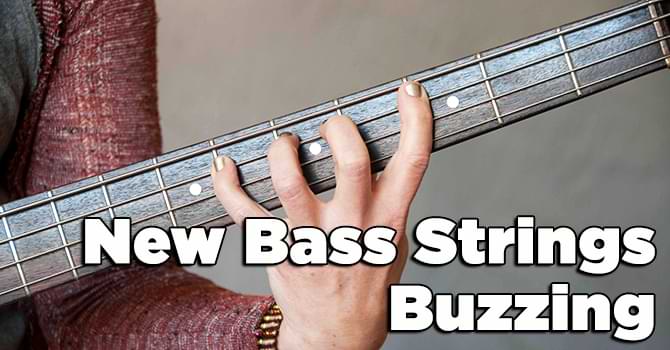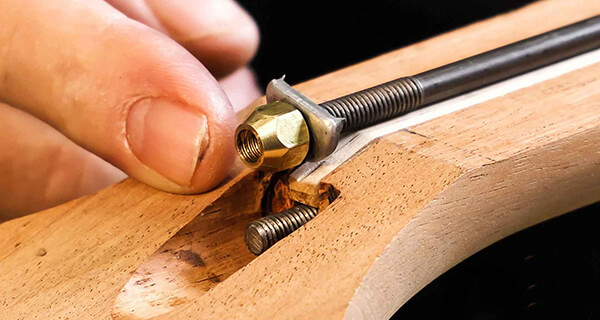New Bass Strings Buzzing [Reason & Fix]
A common frustration for bass players is encountering buzzing sounds when playing their instrument. This unwelcome phenomenon can significantly impact the overall tone and playability of the bass. Understanding the root causes of string buzzing and knowing how to address them effectively is crucial for any bassist seeking to maintain optimal performance.
In this comprehensive guide, we will explore the various reasons behind new bass strings buzzing and provide practical solutions to resolve the issue.

# Table of Contents =>
I. Understanding the Basics –
What is String Buzzing?
String buzzing refers to the unwanted rattling or buzzing sound produced by the strings when played, resulting from their contact with the frets or other parts of the instrument. It is particularly common when new bass strings are installed, but it can also occur with old or poorly maintained strings.
Importance of String Height (Action)

The height of the strings, commonly referred to as the “action,” plays a crucial role in preventing string buzzing. The action directly impacts the distance between the strings and the fretboard. Optimal action not only enhances playability but also minimizes the risk of buzzing.
II. Causes of New Bass Strings Buzzing:
a) High String Action
If the strings are set too high above the fretboard, they require more force to press down, increasing the likelihood of buzzing. High action can be caused by improper setup or a warped neck.
b) Uneven Frets

Frets that are not level can lead to uneven string contact, resulting in buzzing. This problem can be exacerbated with new strings due to their higher tension.
c) Nut Issues
A poorly cut or worn nut can cause the strings to rest at an incorrect height, leading to buzzing.
d) Bridge Problems

A faulty or poorly adjusted bridge can affect the tension and alignment of the strings, causing buzzing.
e) Truss Rod Mis-adjustment
An improperly adjusted truss rod can alter the curvature of the neck, leading to buzzing.
f) String Quality
In some cases, the buzzing issue may arise due to poor quality or defective strings.
III. Effective Solutions:
a) Bass Setup and Adjustment

The first step to address string buzzing is a thorough bass setup. If you are unsure about this process, it is recommended to take your instrument to a qualified luthier. A proper setup will involve adjusting the string action, checking the truss rod, and evaluating the condition of the frets, nut, and bridge.
b) Truss Rod Adjustment

If the bass neck exhibits a bow or back-bow, it might be necessary to make adjustments to the truss rod to achieve the correct curvature. Nevertheless, it is crucial to approach truss rod adjustments with utmost care, as improper handling can lead to potential damage to the instrument.
c) Fret Leveling
If uneven frets are the cause of the buzzing, fret leveling by a skilled technician can alleviate the problem. This process involves sanding down the high frets to ensure even contact with the strings.
d) Nut Repair or Replacement
A skilled luthier can repair or replace the nut to ensure the strings rest at the correct height and angle.
e) Bridge Adjustment
Fine-tuning the bridge height and alignment can rectify buzzing caused by bridge issues.
f) String Change
If the buzzing persists despite attempting the above solutions, consider trying a different set of high-quality strings from a reputable manufacturer.
IV. Preventive Measures:
a) Regular Maintenance
Keep your bass clean and well-maintained to prevent issues like nut wear or bridge problems.
b) Climate and Humidity
Maintain a stable environment for your bass, as extreme temperature and humidity changes can impact the instrument’s setup.
c) String Stretching
Stretching new strings properly after installation can minimize the initial settling and potential buzzing.
In the end, string buzzing on new bass strings buzzing can be frustrating, but armed with knowledge and the appropriate solutions, you can conquer this common problem. Regular maintenance, a proper setup, and timely adjustments will ensure your bass performs at its best, delivering the rich, smooth tones you desire.
Remember, if you’re uncertain about any adjustments, consult a professional luthier to ensure the longevity and health of your instrument. Happy playing.
FAQs –
Q: How long does buzzing from new strings last?
A: The buzzing usually subsides as the strings settle, typically within a few hours to a day of playing. If it persists, it might indicate other issues that need addressing.
Q: Can incorrect string installation cause buzzing?
A: Yes, improper installation can lead to buzzing. Make sure you have wound the strings correctly around the tuning pegs and secured them properly at the bridge.
Q: Is string gauge related to buzzing?
A: String gauge can influence buzzing. Heavier gauges exert more tension and might reduce buzzing, while lighter gauges might lead to more buzzing if your bass isn’t set up properly.
Q: Can buzzing be due to a truss rod issue?
A: Yes, a truss rod that’s not properly adjust and can cause buzzing. If the neck has too much or too little relief, it can affect the string action and lead to buzzing.
Q: What’s the role of the nut and bridge in buzzing?
A: The nut and bridge are contact points for the strings. If they are improperly cut or too low, the strings might vibrate against the frets, causing buzzing.
Q: Is buzzing on all frets or specific frets more concerning?
A: Buzzing on specific frets is usually a sign of uneven frets or an issue with the neck. Buzzing across all frets could indicate a more general setup problem.
Last Updated on September 14, 2023 by Perry Garner


